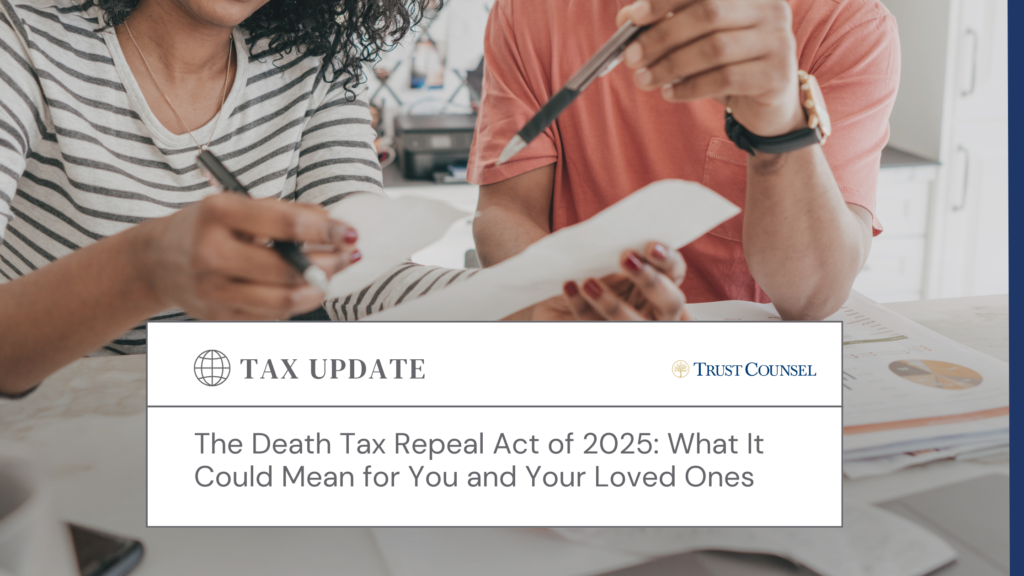Have you ever worked your entire life to build something valuable, only to worry about a significant portion being taken away after your death, and before it gets to the people you love? That’s the reality many American families face when thinking about the estate tax – sometimes called the “death tax.” There’s a legislative proposal gaining momentum that could change everything about how wealth transfers between generations. But what would these changes really mean for you and your loved ones?
Let’s explore the potential impact on you and those you love.
The Estate Tax: A Century-Old Tradition at a Crossroads
Estate taxes have been woven into the fabric of American taxation for over a century, yet they remain one of the most contentious elements of our tax system. The current estate tax applies to estates valued above a certain threshold, meaning that when someone passes away, the government may take a percentage of their assets before they reach the next generation.
Think of it this way: imagine spending decades cultivating a beautiful garden, only to have someone come in at the end and claim rights to some of your most prized plants before your children can enjoy them. That’s how many families perceive the estate tax – as an additional burden during an already difficult time.
The Death Tax Repeal Act of 2025 (“DTRA”) aims to eliminate this tax entirely, which supporters argue would remove what they see as unfair double taxation. After all, these assets were typically built with income that was already taxed once during the owner’s lifetime. Why, they ask, should it be taxed again simply because of death?
The potential repeal brings both opportunities and challenges that deserve careful consideration. Let’s explore what this could mean from different perspectives.
Weighing the Benefits and Drawbacks for American Families
Other than one year in 2010 when the estate tax rate was zero, the federal estate tax has been as low as 10% in the first year it was introduced (1916) and as high as 77% (1941-1976). The current federal estate tax rate is 40% on assets over $13.61 million. In 2026, unless Congress acts, the exemption will drop back to around $6–7 million per person, roughly half the current amount, adjusted for inflation, and the estate tax rate on assets passed on at death above that amount will be 40%.
For people with highly appreciated or hard-to-liquidate assets (such as business owners or land owners), the repeal could represent breathing room. The estate tax can create an impossible situation: either sell portions of the business or land to pay the tax or take on massive debt to the IRS. Either way, the family legacy suffers.
Critics of the repeal point to important considerations on the other side. The estate tax generates revenue that helps fund essential government services like education, infrastructure, and social programs that benefit all Americans. If this revenue stream disappears, that funding will need to come from somewhere else – potentially from taxes that affect more middle and working-class families.
Additionally, some economists worry about the long-term effects on wealth concentration. Without an estate tax, extremely wealthy families could potentially accumulate and transfer wealth across generations with fewer limitations, possibly widening existing economic divides.
As you think about your own situation, consider this: What matters most for your loved ones’ future? Is it maximizing the assets you can pass down, or ensuring broader economic opportunities for all? There’s no perfect answer, and reasonable people can disagree on the right approach.
How the Repeal Could Change Your Estate Planning Strategy
If the DTRA passes, it would dramatically change how many Americans approach their estate planning. Let’s explore what this might mean for your personal strategy:
Simplified Planning for Larger Estates: For those with estates valued above the current exemption threshold, planning could become significantly simpler. Many complex strategies designed specifically to minimize estate tax exposure – like certain types of trusts, family limited partnerships, or life insurance arrangements – might become unnecessary.
Focus Shift to Income Tax Planning: Without estate taxes to worry about, the focus would likely shift to income tax planning for heirs. This means potentially more attention to basis step-up rules, timing of asset transfers, and other strategies to minimize capital gains taxes when assets are eventually sold.
More Flexibility in Charitable Giving: Many wealthy individuals currently incorporate charitable giving into their estate plans partly for tax benefits. Without estate tax incentives, charitable giving patterns might change, allowing decisions based purely on philanthropic goals rather than tax advantages.
What does this mean for you? If your estate might exceed the current exemption threshold (approximately $13.99 million for individuals or $27.98 million for married couples for 2025), now is the time to connect with me to discuss potential scenarios. Even if your estate falls below these thresholds, changing tax laws can have ripple effects on overall estate planning best practices.
Preparing for an Uncertain Future with an Estate Plan
While the DTRA represents a significant potential change, it’s important to remember that tax legislation is notoriously difficult to predict. Bills can change dramatically during the legislative process, and what passes may look very different from what was initially proposed.
Given this uncertainty, how should you approach your estate planning? Here are some practical steps to consider:
- • Review your current estate plan with me so we can discuss how potential tax changes might affect your specific situation.
- • Explore “what if” scenarios. When you work with me, we’ll examine the “what if ” scenarios to ensure your plan remains flexible enough to adapt to various legislative outcomes.
- • Consider your true legacy goals beyond tax minimization. What values, assets, and lessons do you most want to pass on to future generations?
- • Communicate openly with loved ones who might be affected by these potential changes.
While traditional estate planning often focuses narrowly on documents and tax avoidance, my proprietary Life & Legacy Planning Process takes a more comprehensive and adaptable approach. Unlike conventional estate plans that sit in a drawer gathering dust, Life & Legacy Planning includes regular reviews to ensure your plan evolves as tax laws, your assets, and your family dynamics change. I won’t just help you create documents; I’ll be your trusted advisor throughout your lifetime, proactively reaching out for updates and providing education so you fully understand what will happen to your loved ones and assets if you become incapacitated and when you die. With Life & Legacy Planning, you’ll have peace of mind knowing your plan will actually work when your family needs it most, regardless of how tax laws might change in the future.
At Trust Counsel, We Help You Move Forward with Confidence
We understand how tax legislation like the DTRA can impact your loved ones’ financial future. Whether this act passes or not, having a comprehensive Estate Plan ensures your wishes are honored, your loved ones are protected, and your plan works the way you want, regardless of changing tax laws.
Don’t leave your loved ones’ future to chance or uncertainty. That’s why when you work with me, we’ll start with a Strategy Session, during which you will get more financially organized than you’ve ever been before and make all the best choices for the people you love. Then, together, we’ll create a plan for you that prepares your loved ones for whatever lies ahead.
This article is a service of Trust Counsel, a Personal Family Lawyer® Firm. We don’t just draft documents; we ensure you make informed and empowered decisions about life and death, for yourself and the people you love. That’s why we offer a Family Wealth Planning Session™, during which you will get more financially organized than you’ve ever been before and make all the best choices for the people you love. You can begin by calling our office today to schedule a Family Wealth Planning Session™.
The content is sourced from Personal Family Lawyer® for use by Personal Family Lawyer® firms, a source believed to be providing accurate information. This material was created for educational and informational purposes only and is not intended as ERISA, tax, legal, or investment advice. If you are seeking legal advice specific to your needs, such advice services must be obtained on your own separate from this educational material.






